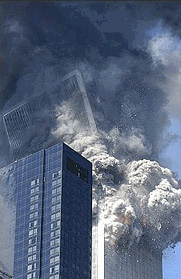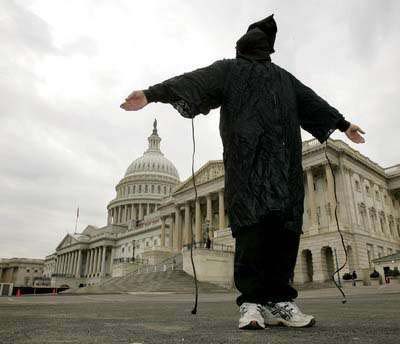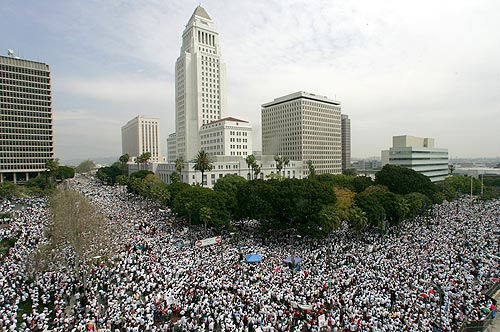  Soc 450: Globalization and Social Change  Spring 2006 Instructor:
Dr. Gonzalo Santos Class: MWF
12:30 pm - 1:55 pm,
DDH-101E |
  Soc 450: Globalization and Social Change  Spring 2006 Instructor:
Dr. Gonzalo Santos Class: MWF
12:30 pm - 1:55 pm,
DDH-101E |
Textbooks:
Course Content:
This course explores the dynamics of
globalization in the contemporary world, as it affects, and in turn is
affected by, the world's
social structures and its processes of social change. We will explore
three broad and interrelated areas, in the same
order as the textbooks listed above: (a) the universally pursued goal
of national development in the world's South, from
the end of the colonial era after World War II, through the demise Cold
War and advent of the Washington Consensus, and the relationship of
this history to the enduring structures of global stratification; (b)
the analysis of the multiple dimensions and trends of global
integration, their impact on the contemporary world-system, and the
social action it is provoking; (c) the direct domestic political
effects of the crisis of U.S. global hegemony since the end of the Cold
War, and particularly since the attacks of September 11, 2001.
Course Structure:
The course will use the traditional lecture/discussion model as we
study the McMichael book. Afterwards, as we study the other two books,
the course will be run as a seminar. Students will form nine groups of
three students each, and
after April 19 will take turns introducing and analyzing the assigned
readings for
each
session, followed by class discussion. That way each student will make
a class presentation twice in the quarter.
Attendance is mandatory (please, no tardiness or early departures, as these will be penalized). All students must come prepared to discuss the readings - either when they make their formal presentations, or by bringing to class their reading assessments if they are not presenting. Copies of both presentation outlines and reading assessments must be turned in to Dr. Santos at the beginning of each class session.
The students will also collaborate in their groups to produce two research projects on topics related to the areas covered in the course -- each student will therefore write two research papers.
Class Presentations:
At the beginning of the course, all students will be organized in
groups of three. Every class after 4/19, by rotation, a student group
will present the
assigned readings
of the day; short class discussions will follow each of the
presentations;
the groups will previously coordinate with each other and within
themselves how they "split" the readings.
Each presenting student will introduce and summarize
his/her
own selection of the readings, and raise a few key issues and
questions
for subsequent discussion. Time allotted per individual presentation
will
be 10-to-15 minutes. Each presenting student must provide Dr. Santos
with a one-page outline
of his/her presentation, including one or two
questions for discussion (please put these at the end).
Please
put on top of your outline page your name, the date, and the reading
selection you are presenting. The outline should use roman numerals for
the main
areas
of the presentation (I., II., III., etc.), with lower-case letters --
a),
b), c), etc. -- for subtopics; please avoid narratives and paragraphs
and
just focus
on well-organized titles
and subtitles. At a
minimum there ought to be
(I) an
introductory
section identifying the topic(s), (II) a section going over the main
analysis, arguments, and facts, (III) a summary/conclusion section, and
(IV) a section for
questions/issues
for discussion.
It is strongly recommended students bring their full
presentations
written up in cards or PowerPoint that follow the order of the topics
and subtopics
in their outlines.
Visual
aids - big charts, overhead slides, PowerPoint slides, handouts, etc. -
may be included in the
presentations but are not required.
The presentations will be graded based on: (a) the conceptual &
organizational quality and clarity of the outline, (b) the analytical
strength of the presentation, including the questions posed at the end,
and (c) the quality, clarity, & style of the oral presentation
(plus any visual aids).
Reading Assessments:
All students must come to every class -- including when we study the
McMichael book -- prepared to discuss the assigned
readings
for the day. To ensure that they do, students who are not
presenting must bring to class a written "reading assessment," of no
more than a page or two of double-spaced text, of the
assigned readings for the day. No
late reading assessments will be accepted, unless the students has an
authorized absence from Dr. Santos.
These reading assessments must not summarize or describe the
readings,
but must personally and critically respond to them,
express what the student thinks about them: they should
identify the
areas
of strong agreement and disagreement
with
the author, explaining why,
as well as the areas or topics of most
interest
to pursue, or
anything in particular that caused amazement, puzzlement, or surprise.
Whatever you write, you should explain
your
specific
analytical and personal reasons for doing so. The reading
assessment need not
cover
every issue found in the assigned readings for the day, but it should
demonstrate
you read everything and chose well
what to comment on (early topics are
always suspect!). A very bad assessment will
reveal the student read
very little or very
superficially just to do the assignment (it's called "going through the
motion"). A good
assessment
will demonstrate the student really read all the material and did a
serious
effort to chose and critically grapple with the main issues involved.
At the end
of the reading
assessment,
students should always list a couple of questions or issues for class
discussion. Dr. Santos will randomly select a couple of students to
read their assessments and/or questions in the discussion periods.
Please
put on top of your reading assessments your name, the date, and the
readings you are assessing.
Note: Students
presenting on a given day do not need to submit any reading assessment.
Research Papers: Each student group will collaborate in designing, researching, and writing two research volumes on topics related to the main areas of the course. Each volume will contain 3 individual papers related to different aspects of the volume's topic. The papers need to be submitted in both electronic form and printed on paper. The first volume is due on Friday, May 5 in class. The second volume is due on Wednesday, June 7, before noon, at Dr. Santos' office.
All topics - group as well as individual - must be pre-approved by Dr. Santos: for the first paper, no later than April 14; for the second paper, no later than May 12.
Each printed volume should be bound and should include a title page and a table of content, listing each paper by title and author. Each individual paper should be between 6 and 8 pages long (excluding the bibliography). For a precise guide on the paper's format and citation style, go to:
http://www.csubak.edu/~gsantos/guide-paper.htmlEach individual paper should pose a central argument, or thesis, or hypothesis, and include the following sections: an introduction, stating the thesis/topic, as well as the theoretical approach and methodological framework of the paper; an analytical section on the relevant historical & contemporary processes, facts, data, related to the topic; this section should not only be descriptive, but it should include your critical analysis to explain these things, as well as other plausible alternative explanations in the literature and your critique of them; your summary and main conclusions; a bibliography; appendices (if any). The bibliography ought to reflect a good search on the World Wide Web, as well as consulted books and scholarly journals in the library. Appendices should include charts, graphs, and figures covering the pertinent topic - the better selected, relevant, and more global in nature, the better. No need for a group bibliography - each papers' own will suffice.
Plagiarism: To
prevent students from wittingly or unwittingly engaging in plagiarism,
Dr. Santos strongly recommends students to carefully read and abide by
the document CSUB
Classifications of Plagiarism found at: http://www.csub.edu/tlc/options/resources/plagiarism/4plagiarimclassifications.htm.
Grading: Each research paper is worth 25 points - adding up to half of the grade. Each class presentation is worth 10 points. The reading assessments all together are worth the other 30 points. Extra points depends on the grades student get in the GST classes (0-3 per class). Every absence is penalized by taking one point off the final grade (apart from the zero grade you'll get for either a failed presentation or a missing reading assessment); tardiness/early departures are penalized by 1/2 point off. The final letter grade will be assigned, on a scale of 0 to 100, as follows:
90- 93 = A- 80-83 = B- 70-73 = C-
87- 89 = B+ 77-79 = C+ 65-69 = D < 65 = F
Dr. Santos prefers students either come to his office during office hours or call him by phone, rather than to receive e-mail messages that require more than a one-line reply. This is due to his large email traffic and the ease of talking, as opposed to typing! But if you wish to send Dr. Santos a brief, to the point, personal message, you may do so at his address above.
Schedule of Reading
Assignments
|
|
|
|
| 3/27 to the course |
3/29 Pp: xxii - xlii |
3/31
César
Chávez Day: NO CLASS
|
| 4/ 3 Ch: 1 Instituting the Development Project (1940s-70s) |
4/5 Ch: 2 Development Project in Global Context |
4/7 Ch: 3 Global Economy Reborn |
| 4/10
Ch: 4 Rise of Global Managerialism |
4/12 Ch: 5 Instituting the Globalization Project |
4/14 Ch: 6 Globalization Project Instabilities |
| 4/17 Ch: 7 Social Responses to Globalization |
4/19 Ch: 8 Whither Development |
4/21 Appelbaum & Robinson Group 1: Articles 4, 5, 6 |
| 4/24 Group 2: Articles 9, 10, 12 |
4/26 Group 3: Articles 14, 15, 16 |
4/28 Group 4: Articles 17, 18, 19 |
| 5/1 Group 5: Articles 20, 21, 22 |
5/3 Group 6: Articles 23, 24, 25 |
5/5
Group 7: Articles 27, 28, 29 [1st. Research Paper Due] |
| 5/8 Group 8: Articles 30, 32, 33 |
5/10
Group 9: Articles 31, 34, 35 |
5/12 Appelbaum & Robinson
Group 1: Articles 36, 37, 38 |
| 5/15 Berman
Group 2: Intro. & Chapter 1 |
5/17 Berman
Group 3: Chapter 2 |
5/19 Berman
Group 4: Chapter 3
|
| 5/22 Berman
Group 5: Chapter 4 |
5/24 Berman
Group 6: Chapter 5 |
5/26 Berman
Group 7: Chapter 6 |
| 5/29 |
5/31 Berman
Group 8: Chapter 7 |
6/2 Berman
Group 9: Chapter 8 |
| 6/5 Berman
"Best Group Presenters": Chapter 9 |
THE DEADLINE FOR THE SECOND PAPER IS NOON, WEDNESDAY, JUNE
7
|
|
My group number is: ______
My other group members' names/phones/email addresses:
1.
___________________________________________________________________
2. ___________________________________________________________________
My group's presentations will be on:
Date: My own presentation will be on:
1. _______________________________________________
2.
_______________________________________________
My group's first research
project is on: _____________________________________
My research paper
topic is: _______________________________________________
My group's second research
project is on:
__________________________________
My second research paper topic is: _______________________________________